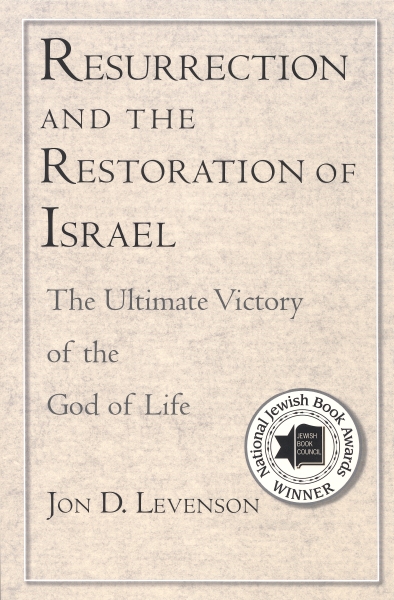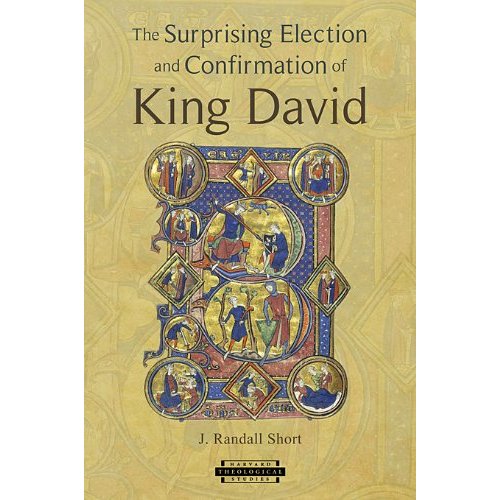What They’re Already Saying About My Book
I’ve thought about things I can do to build some anticipation around the launching of my first book, The Surprising Election and Confirmation of King David (Harvard Theological Studies). It won’t be out until May, so I have a few months to go. For instance, I could have a lot of fun making a book trailer, and a trailer for a dissertation-turned-into-book might even create some buzz. But I’m afraid I don’t have the right set of skills to pull it off.
I’ll start, instead, by letting others speak for me. The fact is, very few people have read my book so far — it’s not out yet, after all. But I’m happy to say that the people who’ve read it are experts about these things, and they had some very positive and encouraging things to say.
Jon D. Levenson was my doctoral advisor at Harvard Divinity School. According to this most trustworthy source that professors just love for their students to cite, he is “the most interesting and incisive biblical exegete among contemporary Jewish thinkers.” Professor Levenson had this to say about my book:
This provocative and well-reasoned interpretation of David’s rise to kingship challenges the standard political reading of the narrative and impressively recovers its key theological dimensions. By refusing to assimilate the text to its putative ancient Near Eastern parallels, Randall Short enriches our understanding of an exceedingly subtle and complex narrative in a valuable way. This volume should command the attention of scholars, students, and clergy alike.
Recent books by my doctoral advisors

Resurrection and the Restoration of Israel by Jon D. Levenson
and Sin: A History by Gary A. Anderson
Gary A. Anderson was also my advisor at Harvard until he moved to the University of Notre Dame. But even after his move, he continued to advise me by serving on my dissertation committee. At some point I expect the above-cited source to describe him as “the most interesting and incisive biblical exegete among contemporary Catholic thinkers” (he’s a little younger than Prof. Levenson, so give it time). Professor Anderson offered this statement:
It is not frequent that a book comes along and proposes a bold new approach to a problem that was once thought to be solved. Short’s bold and deftly argued thesis about the founding of the Davidic Kingdom is going to mark a new direction for the exegesis of I and II Samuel.
I’m indebted to and grateful for these men, and I’m deeply honored to have them evaluate my work so highly.
Let me share comments about my work by two more scholars. I don’t know their names because the comments were from two anonymous reviewers of my manuscript at an early stage in Harvard Theological Studies’ review process. The below statements came to me along with several constructive criticisms that helped me to make a number of improvements.
One reviewer said this about my manuscript in general:
[Short’s book] has a clear and important thesis to put forward on an important text and issue in Hebrew Biblical studies, and everything, so far as I can see, is very well arranged around the definition, exposition, and substantiation of this thesis, in a style that is lucid, direct, and precise: few, if any solecisms or baroque formulations typical of dissertations. It makes its case by a serious critique of one standard view of the History of David’s Rise (HDR), and then by a penetrating, closely observed analysis of facets of the literary techniques and themes of the HDR . . .
And another reviewer said this about my chapters 4 and 5:
I have found his analyses of the individual verses to be detailed and reasonable. The impression that Short’s text gives is that he attends to the interpretation of individual verses or texts with great care.

Andover Hall, Harvard Divinity School, Cambridge, Massachusetts
I don’t mean to imply that my advisors and reviewers agree with me about every position I take. That is certainly not the case, but no one who knows the field of biblical studies would expect it to be.
I am extremely pleased, though, that these scholars all agree on this point: You’ll benefit from reading my book if you have any interest in Samuel’s account of David’s rise to kingship in particular and/or modern biblical scholarship in general.
 RSS - Posts
RSS - Posts




Ken Brown 3:56 am on March 2, 2010 Permalink |
That’s great news indeed. Congrats!
(BTW, I love that the social media buttons on your posts say “Share and Enjoy”; I just hope they work better than a typical Sirius Cybernetics Corporation product!)
Randall Short 10:10 am on March 2, 2010 Permalink |
Thank you!
I’m a bit embarrassed to say that I haven’t tested the social media buttons here. If they weren’t there by default, I must have turned them on and left it at that. I just switched on a few more buttons, including one for Twitter; I’ll test the ones I can (I don’t use most of them).
Nathan 12:25 pm on March 10, 2010 Permalink |
I assume you’re putting Cambridge on the book tour…
Randall Short 9:45 pm on March 10, 2010 Permalink |
Now that would be nice. Unfortunately no plans just yet. But I’ll try to schedule it when I hear from one of the big talk shows offering to cover my international travel expenses…